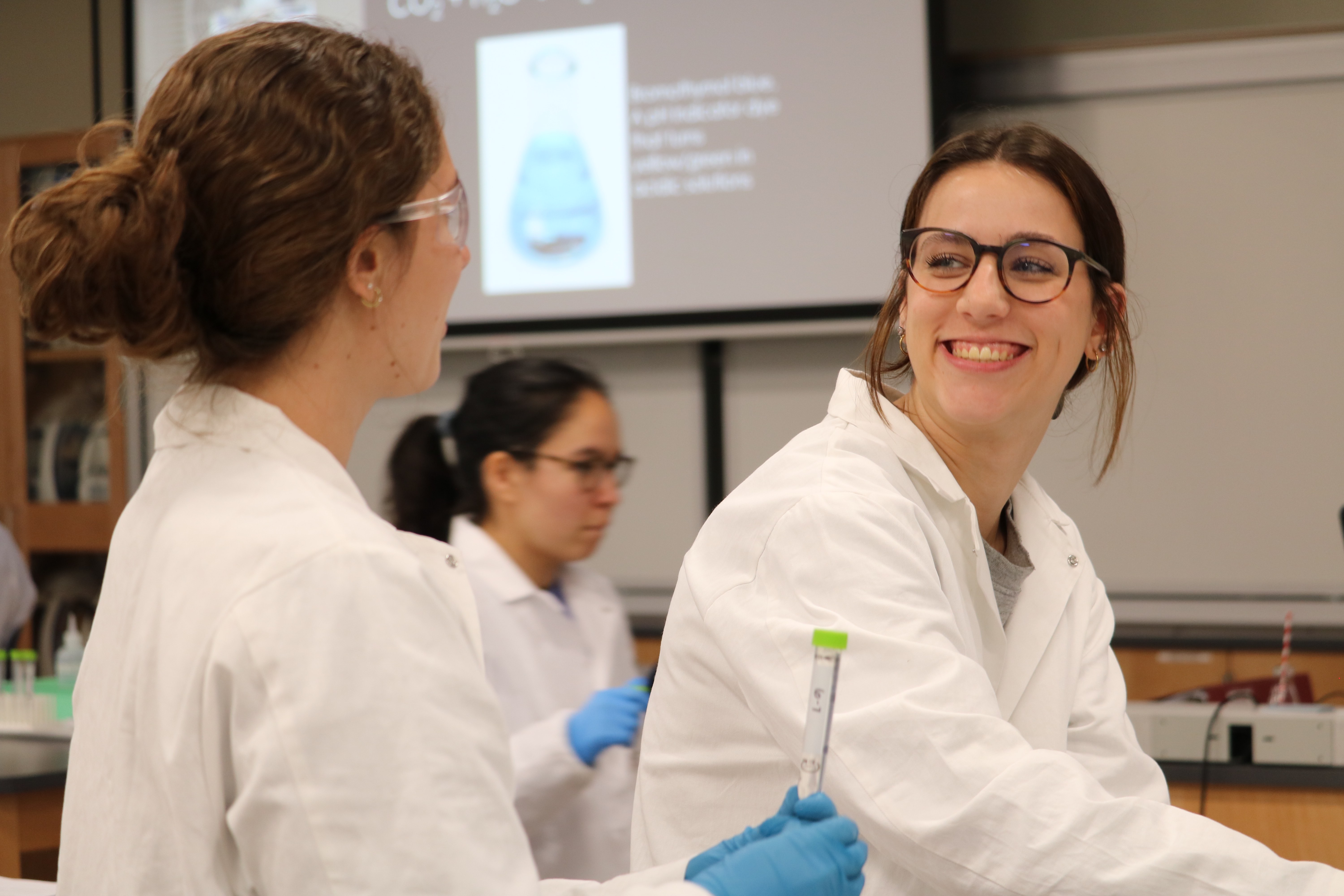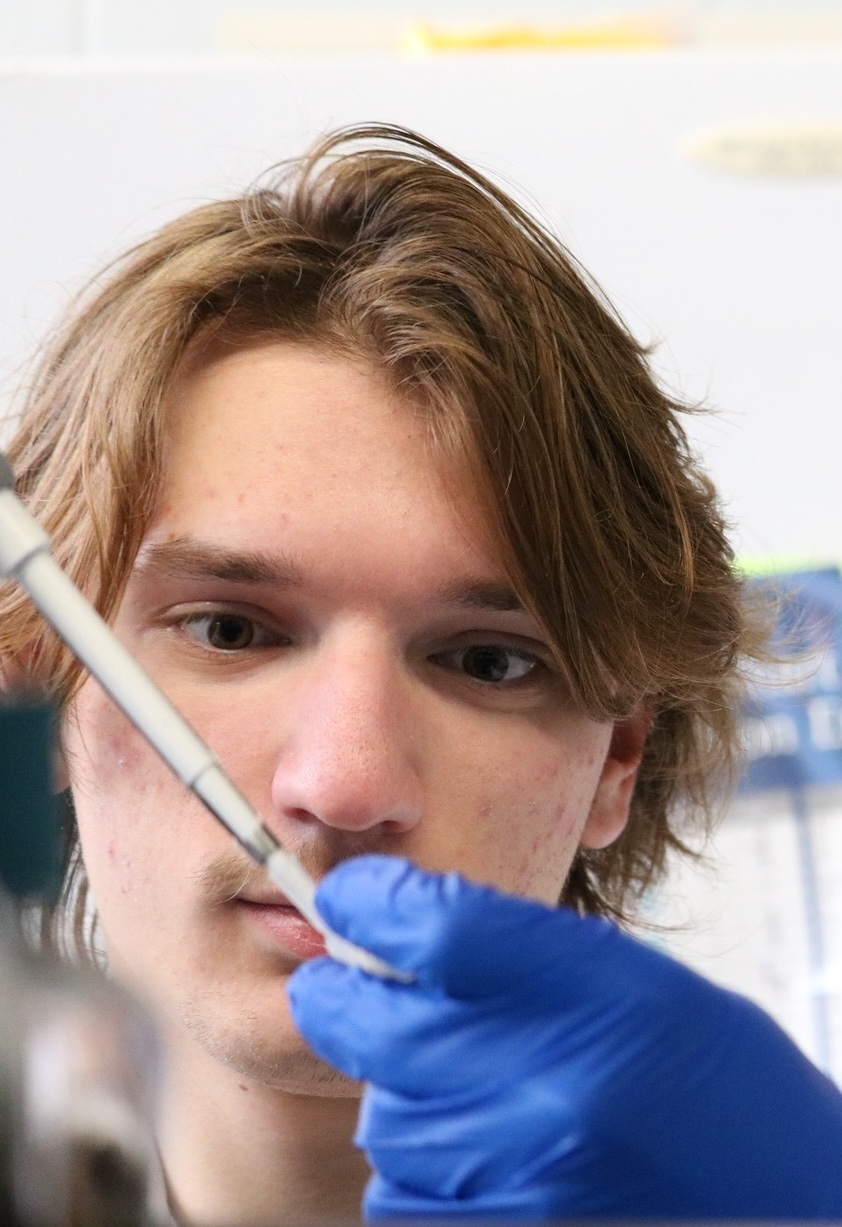Biological Sciences
Your learning experience will thrive on our comprehensive approach to the life sciences. Our interdisciplinary curriculum is designed to provide you with a well-rounded education, starting with foundational courses in biology, chemistry, physics, and statistics. These courses lay the groundwork for more advanced biology subjects that will deepen your understanding of the field.
You will engage in inquiry-based scientific exploration through our capstone course. This hands-on experience allows you to apply your knowledge and develop critical thinking skills. Additionally, we offer various faculty-led research projects, giving you opportunities to participate in scientific discovery.
For those aspiring to pursue medical school or other healthcare-related graduate programs, our program offers comprehensive pre-med/pre-health preparation. We provide the necessary resources and guidance to support your ambitions in these fields.
To cater to your specific interests and career goals, we offer four concentrations within the program: General Biology, Molecular Biology, Physiology, and Evolution & Organismal Biology.
- With the General Biology concentration, you have the flexibility to personalize your coursework according to your specific interests and academic pursuits.
- Our Molecular Biology concentration holds accreditation from the ASBMB and is an ideal choice for those interested in medicine, public health, or genetic counseling. The specialized curriculum in these areas will provide you with a solid foundation.
- If you're fascinated by the intricacies of human and animal physiology and wish to explore health and disease topics further, the Physiology concentration offers advanced coursework to deepen your knowledge in these areas.
- For students passionate about environmental conservation and sustainability, our Evolution & Organismal Biology concentration focuses on evolution, ecology, and biodiversity. By choosing this concentration, you'll acquire the knowledge and skills needed to address pressing environmental challenges.
To guide you on your academic journey, please refer to the suggested course sequence below.
Program Information
The Bachelor of Science in Biological Sciences program aims to equip students with a strong foundation in the life sciences. Graduates are prepared for a wide range of career paths in research, healthcare, environmental sciences, biotechnology, education and beyond.
Program Type
Major
Degree
Bachelor's
Academic Department
Biological Sciences
Duration
4-year
Required Credit Hours
122
Hear From An Alum
Prepared For Anything
Student Outcomes
As an undergraduate student in the Bachelor of Science in Biological Sciences program, you can expect to achieve a wide range of impactful outcomes. Our program is designed to equip you with a strong foundation in the life sciences while offering specialized knowledge and skills in your chosen concentration.
Research Opportunities
In the Bachelor of Science in Biological Sciences program, you will gain proficiency in scientific research through coursework and research experiences. You will learn research methodologies, experimental design, data analysis, and interpretation, honing your critical thinking and creative skills. The program offers valuable opportunities for hands-on undergraduate research, allowing you to collaborate closely with faculty mentors, contribute to scientific investigations, and gain practical research experience. These experiences will prepare you for further research pursuits, graduate studies, and diverse professional paths, including medical and research-related graduate programs.
Capstone Courses
Our inquiry-based capstone course will enhance your scientific writing and communication abilities, mastering the art of presenting research findings and concepts with clarity and precision. You will gain expertise in writing research papers, lab reports, and delivering scientific information to diverse audiences. By developing strong critical thinking skills, you will excel in analyzing intricate biological phenomena, identifying research gaps, and proposing innovative solutions. These skills will empower you to tackle real-world challenges in Biological Sciences effectively.
Pre-Med/Pre-Health Preparation
For those aspiring to pursue medical school or other healthcare-related graduate programs, our comprehensive curriculum offers thorough pre-med/pre-health preparation to equip you with the necessary knowledge and skills for these pursuits. Throughout the program, you will engage in foundational courses in the life sciences, including subjects such as anatomy, physiology, genetics, and biochemistry. These courses provide you with a solid understanding of the fundamental concepts and principles that are essential for medical and healthcare professions. We are committed to helping you achieve your goals and make a positive impact in the field of healthcare.
Graduate Studies
The program will empower you to build a solid foundation for your future endeavors
in Biological Sciences, Biotechnology, Medicine, Healthcare, or related fields. You
will acquire the essential qualifications to pursue advanced degrees, including Master's,
Ph.D., or MD degrees, as well as other healthcare-related programs, allowing you to
deepen your knowledge and specialize in your specific areas of interest. This comprehensive
preparation will enable you to excel in your chosen path and advance your expertise
through further research and advanced studies.
Careers In Biological Sciences
As a graduate of our program, you will be equipped with the expertise and practical experience needed to embark on a variety of rewarding careers in the dynamic field of Biological Sciences. Your comprehensive knowledge, advanced skills, and research experience will open doors to diverse opportunities in academia, research, biotechnology, medicine, dentistry, veterinary medicine, healthcare, environmental conservation, government agencies, and other related industries. With a range of career paths available to you, you'll have the flexibility to pursue your passion and make a significant impact in your chosen area of specialization.
Suggested Course Sequence
To assist students in achieving their academic goals within the B.S. in Biological Sciences program, we recommend the following course sequence. It is important to note that BRDG courses can be completed in any order throughout the undergraduate curriculum, allowing for greater flexibility in scheduling.
Undergraduate research is highly encouraged. Our department recognizes the value of research and the significant contributions it can make to the scientific community. Therefore, we provide ample opportunities for students to engage in research projects with our esteemed faculty.
- CHEM 121/R Chemistry I/Recitation (4 credits)
- CHEM 121L Chemistry I Lab (1 credit)
- BIOL 115 / 115L Adv. Biology I / Lab/Recitation (5 credits)
- BRDG 101 Writing and Analysis (3 credits)
- MATH 115 Calculus I (4 credits)
- BIOL 100 - Biology Major Exploration (1 credit)
Spring Semester
- CHEM 122/R Chemistry II/Recitation (4 credits)
- CHEM 122L Chemistry II Lab (1 credit)
- BIOL 117 / 117L Adv. Biology II / Lab (5 credits)
- BRDG 102 Writing and Literature (3 credits)
- General Elective (3 credits)
- BRDG 100 Research & Info Skills (1 credit)
- CHEM 211 Organic Chemistry I (3 credits)
- CHEM 211L Org. Chem I Lab (1 credit)
- BIOL 212 Cell and Molecular Biology (4 credits)
- MATH 225 Intro to Biostatistics (3 credits)
- EQ XXX Essential Questions Seminar (3 credits)
- ENGL 302W Scientific Writing (3 credits)
Spring Semester
- CHEM 212 Organic Chemistry II (3 credits)
- CHEM 212L Org. Chem II Lab (1 credit)
- BIOL ______ Genetics/Mol Bio Topic (3 credits)
- MATH 335 Biostats II - OR - MATH 116 Calculus II (3/4 credits)
- Bridges course - Cultural Fluency (3 credits)
- BIOL 105 Biological Sciences Career Dev (1 credit)
- BIOL ________ Capstone I (4 credits)
- PHYS 201/R Phys for Life Sci I/Recitation (3 credits)
- PHYS 201L Phys for Life Sci I Lab (1 credit)
- BRDG 105 Intro to Ethical Reasoning (3 credits)
- General Elective (3 credits)
- SPRG 108 Service Learning (0/1 credit)
Spring Semester
- BIOL ________ Capstone II (4 credits)
- BIOL ________ Supra-Organismal Topic (3 credits)
- PHYS 202/R Phys for Life Sci II/Recitation (3 credits)
- PHYS 202L Phys for Life Sci II Lab (1 credit)
- Bridges course - Critical Thinking (3 credits)
- BIOL 490 Biology Seminar (1 credit)
Please note: Science/Service Learning (SPRG 108) can be taken for 1 credit anytime during junior/senior year.
- BIOL _______ Organismal Topic (3 credits)
- BIOL _______ Biology Elective (3 credits)
- BIOL _______ Biology Elective (3 credits)
- General Elective (Theology) (3 credits)
- Bridges course - Social & Historical Reasoning (3 credits)
Spring Semester
- BIOL _______ Biology Elective (3 credits)
- BIOL _______ Biology Elective (3 credits)
- Bridges course - Ethical Reasoning (3 credits)
- General Elective (Philosophy) (3 credits)
Biology Topic Areas include one course from Genetics, Supra-Organismal and Organismal
topics. I can help you get started on your academic path. Please contact me if you have questions.Biology Topic Areas
Please note: Supra-Organismal Topic area is not needed for Molecular Biology Concentration.
Learning Outcomes
I Can Help You Reach Your Bigger Goals!
Tiffany Kells





